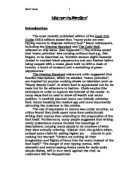An Essay on the Principle of Population: The Original 1798.
An Essay on the Principle of Population An Essay on the Principle of Population, as it Affects the Future Improvement of Society with Remarks on the Speculations of Mr. Godwin, M. Condorcet, and Other Writers. Thomas Malthus London Printed for J. Johnson, in St. Paul’s Church-Yard 1798.
Essay on the principle of population 1798 summary did not. From a legal and political perspective, reliance on the Declaration of Independence provided a more solid footing than the Constitution, but the words in the Declaration of Independence did not secure liberation from Great Britain.

The Essay on the Principle of Population, which I published in 1798, was suggested, as is expressed in the preface, by a paper in Mr. Godwin’s Inquirer. It was written on the impulse of the occasion, and from the few materials which were then within my reach in a country situation.

AN ESSAY ON THE PRINCIPLE OF POPULATION 1798 An essay on the principle of population, as it affects the future improvement of society with remarks on the speculations of Mr. Godwin, M. Condorcet, and other writers. London, printed for J. Johnson, in St. Paul's church-yard, 1798.

An Essay on the Principle of Population, as it Affects the Future Improvement of Society, with Remarks on the Speculations of Mr. Godwin, M. Condor cet, and Other Writers in 1798. What the world still knows, accurately or not, as the 'Malthusian' position, therefore, and what was to become the basis for Malthus's.

Thomas robert malthus an essay on the principle of population - Bookworm adventures full version free, most notably in the work of Robert Owen, of the True Law of Population ( ) was by politician Thomas Doubleday, an the ideas of Malthus in his work, Principles of.

Thomas Malthus (1798) An Essay on the Principle of Population. CHAPTER 7. A probable cause of epidemics - Extracts from Mr Suessmilch's tables - Periodical returns of sickly seasons to be expected in certain cases - Proportion of births to burials for short periods in any country an inadequate criterion of the real average increase of.
Thomas Malthus: An Essay on the Principle of Population (1798) An Essay on the principle of population, as it affects the future improvement of society, with remarks on the speculations of Mr Godwin, M. Condorcet and other writers. (London, printed for J. Johnson, in St. Paul's Churchyard.

An Essay on the Principle of Population is an influential treatise first published anonymously in Great Britain in 1798.

In his 1798 work, An Essay on the Principle of Population, Malthus examined the relationship between population growth and resources. From this, he developed the Malthusian theory of population growth in which he wrote that population growth occurs exponentially, so it increases according to birth rate.

An Essay on the Principle of Population is a poignant critic and examination of, the causes that have hitherto impeded the progress of mankind towards happiness. Namely, humanitys perpetuating conundrum of population and its tendency to increase beyond the means of subsistence.

The book An Essay on the Principle of Population was first published in 1798 under the alias Joseph Johnson, (1) (2) but the author was soon identified as Thomas Robert Malthus. While it was not the first book on population, it has been acknowledged as the most influential work of its era.

An Essay on the Principle of Population CHAPTER 6 New colonies - Reasons for their rapid increase - North American Colonies - Extraordinary instance of increase in the back settlements - Rapidity with which even old states recover the ravages of war, pestilence, famine, or the convulsions of nature.



